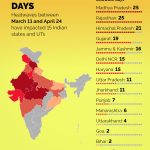Introduction
Russia’s invasion of Ukraine is further disrupting a global food system that was already undermined by Covid and the unfolding climate crisis. I needed only a few minutes of internet search to find many articles that explain the impact of the Ukraine war on food systems and warn of impending crises. They make for sober reading. Everyone can read up-to-date articles firsthand, so I will not reproduce the facts and issues in detail. This concise document from the Food and Agricultural Organisation of the United Nations provides up-to-date factual information as of 11th March 2022. https://www.fao.org/3/cb9007en/cb9007en.pdf
In brief, Ukraine produces a large quantity of grain and sunflower oil that is exported mainly to Middle Eastern and European countries. The war is preventing exports from the Black Sea ports and will greatly reduce the quantities that can be sown and harvested this next year. To add to the challenges for Ukrainian farmers, the manufacture of fertilizers has also been affected, reducing production, availability and pushing up prices. Russia is also a major producer of these basic foodstuffs and their export is affected by sanctions.
And we must hold in mind that while European countries will face an increase in the cost of many – if not all – foods and some shortages, affluent countries will find ways to overcome and off-set these problems. The poorer countries of the Global south that depend on imports of grains from the Black Sea countries are likely to suffer the most.
What I have very briefly outlined are the ‘production side’ issues on an international scale. We worry about the possible impacts and feel despair and powerlessness when faced with situations controlled by the violent destructiveness of war, international industrial systems and politics. It is, however, on the ‘demand side’ that we can exercise agency, however small our individual actions.
The fuel situation offers a good example of a ‘demand-side’ response that invites individual action. EU governments have issued the simple message: reduce the demand for Russian oil and gas by turning down the heating by 1C-2C. This small change in behaviour is achievable. It’s easy to understand that if scaled up through collective commitment it can result in a significant reduction in total demand. Moreover the action contributes not only to a short term strategy but also aligns with a long-term environmental policy to reduce reliance on fossil fuels.
With food, however, the relationship between production and demand is not direct but highly convoluted. The systems of production, export, international circulation and import into secondary national food industries are complex. In Europe the imports of grain and sunflower oil from Ukraine contribute not only to primary foodstuffs but also, within secondary systems, are fed to animals for meat and dairy production. With our interest in pulses – these are a minor crop in Ukraine and it is dry peas that are mainly grown. These too are imported into Europe as animal feed. Food markets are highly integrated with and dependent on other systems like food trading, transport, fuel prices, logistics, and stock markets. When a key player in the global food system, Ukraine, is in trouble, the impact is wide-reaching and unpredictable.
Moreover the alignment with long-term environmental strategies should be built into any response to the food crisis and must not by-pass climate proofing, even as a temporary measure. As we know, the footprint of the large global food industries is much too high. Of all the food system risks, climate and biodiversity crises must remain the most urgent. In short, food production and consumption systems must become less reliant on high carbon-emitting livestock and dairy and more plant-based.
Demand-Side Action
Having researched the current situation, I went looking for guidance that would suggest demand-side, climate-proofed action in response. I found two documents which I introduce here.
Versailles Declaration
This first document is at policy level. This is valuable because if a recommendation for policy is already in place, it can buttress our arguments to wider audiences.
EU National leaders were summoned to an informal summit on 10-11 March 2022. The Versailles Declaration was adopted at the meeting, covering Russia’s aggression against Ukraine and outlining how the European Union can bolster defence capabilities, reduce energy dependencies and build a more robust economic base. Embedded in the document is the following statement:
Food
We will improve our food security by reducing our dependencies on key imported agricultural products and inputs, in particular by increasing the EU production of plant-based proteins.
There – written clearly in the statement is a declaration to increase EU production of plant-based proteins. In addition, the commitment to reduce dependence on imported agricultural products supports initiatives that promote localized, small-scale and diverse food production.
Expert Statement
The second document is produced by the Potsdam Institute for Climate Action Research. In a statement signed by more than 400 expert scientists from a number of countries, they call for ‘demand-side’ action and propose three levers for coping with the short-term shocks while also ensuring human health and long-term sustainable development:
1. Accelerating the shift towards healthier diets with less animal products in Europe and other high-income countries, which would reduce the amount of grains needed for animal feed;
2. Increasing production of legumes and further greening EU agricultural policies, also to reduce the dependency on nitrogen fertilizers or natural gas from Russia;
3. Reducing the amount of food waste, since for instance the amount of wheat wasted in the EU alone is roughly equivalent to half the amount of Ukraine’s wheat exports.
Levers 1 and 2 directly support the increased cultivation of pulses. Lever 3 incidentally, is simply sensible. The quantity of waste is a sad indictment of current social attitudes and habits of using foodstuffs.
Endorsements
These two documents – the first at policy level and the second backing up the policy with expert recommendations – offer strong endorsements for replacing meat and dairy in our diets with plant proteins, and growing more beans on a smaller, local scale in our vegetable gardens, allotments, community gardens and market gardens. Here is the food equivalent of turning down the thermostat by one degree; an individual action at the demand-side that if scaled up collectively would have beneficial impacts.
A message for individual action to alleviate the impending food crisis: ‘eat beans not meat’ would be direct, communicable and achievable. It represents a modest change in behaviour. It would reduce demand for animal food products and that in turn reduces the demand for grain and sunflower oil that are used in feeds. As readers of this newsletter know, growing legumes also reduces the demand for industrially produced nitrogen fertilizers. Importantly, fast-tracking a short term strategy to respond to the immediate situation will align with and accelerate a push towards longer-term goals in reducing the greenhouse gases that are responsible for climate change.
Post-script
As a post-script to this article. In my background reading of online documents I was interested to learn that Ukraine has a high percentage of smallholder farmers who produce vegetables and some animal food products such as eggs and chickens. Giving more prominence and better protection to climate resilient smallholder farming in Ukraine would be a positive step ecologically. It would also alleviate some of the worst consequences of increasing global instability and its impact on large-scale food systems. It would support agro-biodiversity and traditional approaches to vegetable growing. Moreover, there is a social justice perspective that goes hand-in-hand with such an initiative by helping to preserve the independent livelihoods of a large proportion of the rural Ukrainian population. I also searched for information about pulse crops grown by smallholders – and it would seem they grow peas, but not beans, although admittedly the information I could find did not give much precise information about vegetable crops grown by smallholders.




